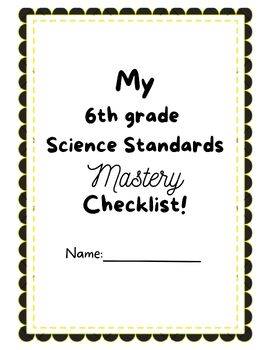6th Grade Science Standards Mastery Checklist (for student or teacher)
Managing IT with Mandy
1 Follower
Grade Levels
6th
Subjects
Resource Type
Standards
NGSSMS-LS1-2
NGSSMS-LS2-2
NGSSMS-LS2-3
NGSSMS-PS2-4
NGSSMS-LS1-1
Formats Included
- Zip
Pages
4 pages
Managing IT with Mandy
1 Follower
Description
This is a checklist that I created for my students, to help them become more accountable of content they have mastered, working towards mastery, or not mastered yet. Teachers could also use it to track student mastery of the standards. These are 6th grade Louisiana Science Standards but also aligned to NGSS.
Total Pages
4 pages
Answer Key
N/A
Teaching Duration
N/A
Report this resource to TPT
Reported resources will be reviewed by our team. Report this resource to let us know if this resource violates TPT’s content guidelines.
Standards
to see state-specific standards (only available in the US).
NGSSMS-LS1-2
Develop and use a model to describe the function of a cell as a whole and ways the parts of cells contribute to the function. Emphasis is on the cell functioning as a whole system and the primary role of identified parts of the cell, specifically the nucleus, chloroplasts, mitochondria, cell membrane, and cell wall. Assessment of organelle structure/function relationships is limited to the cell wall and cell membrane. Assessment of the function of the other organelles is limited to their relationship to the whole cell. Assessment does not include the biochemical function of cells or cell parts.
NGSSMS-LS2-2
Construct an explanation that predicts patterns of interactions among organisms across multiple ecosystems. Emphasis is on predicting consistent patterns of interactions in different ecosystems in terms of the relationships among and between organisms and abiotic components of ecosystems. Examples of types of interactions could include competitive, predatory, and mutually beneficial.
NGSSMS-LS2-3
Develop a model to describe the cycling of matter and flow of energy among living and nonliving parts of an ecosystem. Emphasis is on describing the conservation of matter and flow of energy into and out of various ecosystems, and on defining the boundaries of the system. Assessment does not include the use of chemical reactions to describe the processes.
NGSSMS-PS2-4
Construct and present arguments using evidence to support the claim that gravitational interactions are attractive and depend on the masses of interacting objects. Examples of evidence for arguments could include data generated from simulations or digital tools; and charts displaying mass, strength of interaction, distance from the Sun, and orbital periods of objects within the solar system. Assessment does not include Newton’s Law of Gravitation or Kepler’s Laws.
NGSSMS-LS1-1
Conduct an investigation to provide evidence that living things are made of cells; either one cell or many different numbers and types of cells. Emphasis is on developing evidence that living things are made of cells, distinguishing between living and non-living cells, and understanding that living things may be made of one cell or many and varied cells.


